高三英语名词性从句教案
- 格式:doc
- 大小:39.00 KB
- 文档页数:4
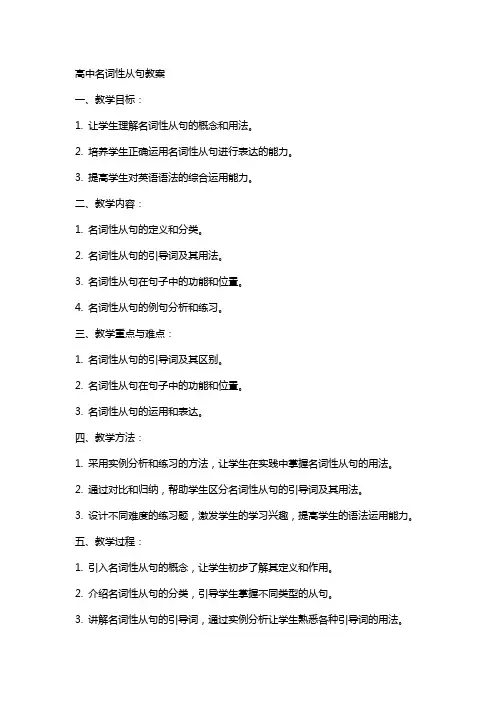
高中名词性从句教案一、教学目标:1. 让学生理解名词性从句的概念和用法。
2. 培养学生正确运用名词性从句进行表达的能力。
3. 提高学生对英语语法的综合运用能力。
二、教学内容:1. 名词性从句的定义和分类。
2. 名词性从句的引导词及其用法。
3. 名词性从句在句子中的功能和位置。
4. 名词性从句的例句分析和练习。
三、教学重点与难点:1. 名词性从句的引导词及其区别。
2. 名词性从句在句子中的功能和位置。
3. 名词性从句的运用和表达。
四、教学方法:1. 采用实例分析和练习的方法,让学生在实践中掌握名词性从句的用法。
2. 通过对比和归纳,帮助学生区分名词性从句的引导词及其用法。
3. 设计不同难度的练习题,激发学生的学习兴趣,提高学生的语法运用能力。
五、教学过程:1. 引入名词性从句的概念,让学生初步了解其定义和作用。
2. 介绍名词性从句的分类,引导学生掌握不同类型的从句。
3. 讲解名词性从句的引导词,通过实例分析让学生熟悉各种引导词的用法。
4. 分析名词性从句在句子中的功能和位置,让学生明白从句的作用。
5. 提供名词性从句的练习题,让学生巩固所学知识,提高运用能力。
6. 总结本节课的重点内容,布置课后作业,让学生进一步巩固所学知识。
六、教学评价:1. 通过课堂表现、练习完成情况和课后作业,评估学生对名词性从句的理解和运用能力。
2. 重点关注学生对名词性从句引导词的识别、从句功能的把握以及句子结构的正确性。
3. 鼓励学生积极参与讨论,提高他们的语法表达自信心。
七、课后作业:1. 完成课后练习题,包括选择题、填空题和改错题,以巩固名词性从句的知识。
2. 选取几个复杂的句子,尝试自己分析其中的名词性从句,并解释其作用。
3. 编写一个包含名词性从句的句子,与同学互相交换并纠正错误。
八、教学拓展:1. 引导学生思考名词性从句在实际语境中的应用,如新闻报道、学术文章等。
2. 讨论名词性从句与其他从句(如定语从句、状语从句)的异同,加深对语法结构的理解。
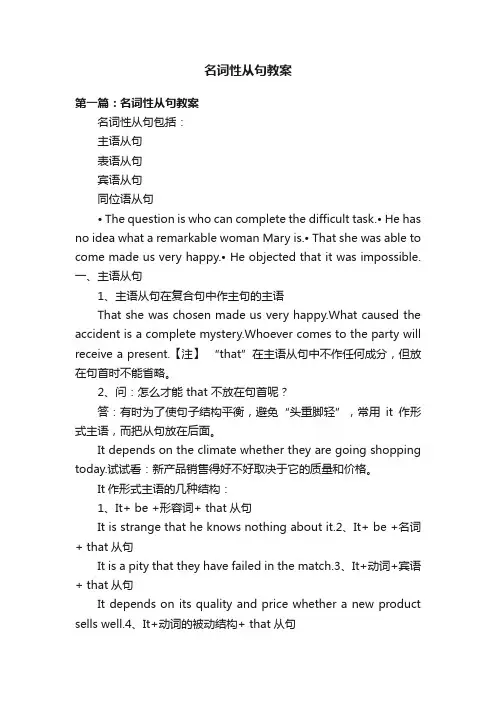
名词性从句教案第一篇:名词性从句教案名词性从句包括:主语从句表语从句宾语从句同位语从句• The question is who can complete the difficult task.• He has no idea what a remarkable woman Mary is.• That she was able to come made us very happy.• He objected that it was impossible.一、主语从句1、主语从句在复合句中作主句的主语That she was chosen made us very happy.What caused the accident is a complete mystery.Whoever comes to the party will receive a present.【注】“that”在主语从句中不作任何成分,但放在句首时不能省略。
2、问:怎么才能 that 不放在句首呢?答:有时为了使句子结构平衡,避免“头重脚轻”,常用it作形式主语,而把从句放在后面。
It depends on the climate whether they are going shopping today.试试看:新产品销售得好不好取决于它的质量和价格。
It作形式主语的几种结构:1、It+ be +形容词+ that从句It is strange that he knows nothing about it.2、It+ be +名词+ that从句It is a pity that they have failed in the match.3、It+动词+宾语+ that从句It depends on its quality and price whether a new product sells well.4、It+动词的被动结构+ that从句It is still unknown which team will win the match.作文常用句式:1、It turned out that...结果是…2、It has been proved that...已经证明…3、It is well-known that...众所周知…4、It must be pointed out that...必须指出…二、表语从句1、表语从句在复合句中作主句的表语The reason is that you don’t trust her.This is where I disagree.例:The reason ____ we didn't trust him is ______ he has often lied.reason 后面的表语从句只能用that 引导, 不能用because 引导, 但reason后面的定语从句可以用why。
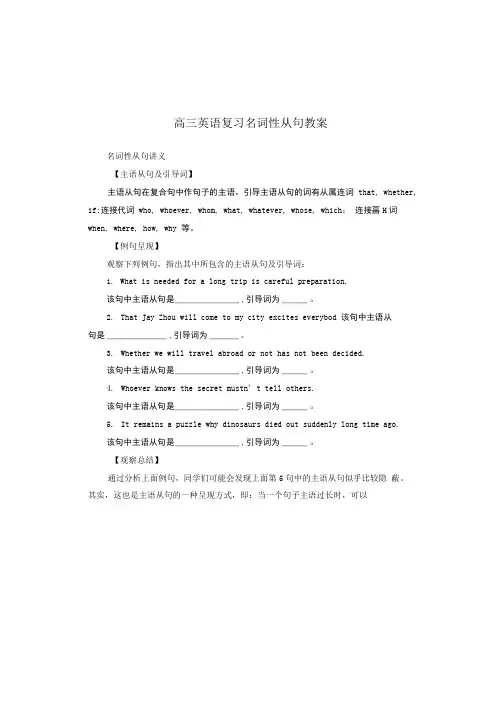
高三英语复习名词性从句教案名词性从句讲义【主语从句及引导词】主语从句在复合句中作句子的主语。
引导主语从句的词有从属连词that, whether, if:连接代词who, whoever, whom, what, whatever, whose, which;连接畐H词when, where, how, why 等。
【例句呈现】观察下列例句,指出其中所包含的主语从句及引导词:1.What is needed for a long trip is careful preparation.该句中主语从句是_______________ ,引导词为______ O2.That Jay Zhou will come to my city excites everybod 该句中主语从句是______________ ,引导词为_______ o3.Whether we will travel abroad or not has not been decided.该句中主语从句是_______________ ,引导词为______ O4.Whoever knows the secret mustn' t tell others.该句中主语从句是_______________ ,引导词为______ O5.It remains a puzzle why dinosaurs died out suddenly long time ago.该句中主语从句是_______________ ,引导词为______ O【观察总结】通过分析上面例句,同学们可能会发现上面第5句中的主语从句似乎比较隐蔽。
其实,这也是主语从句的一种呈现方式,即:当一个句子主语过长时,可以用it作形式主语,而把真正的主语或主语从句后移至句子末尾,以保持句子的平衡。
注意观察下列例句中的划线部分:It is not clear how the accident happened.It is not hard to understand why he did so at that time.It is a pity that you should have made such a careless mistake.It is reported that more than thirty deaths were caused in the acciden 不难看出,虽然上面例句中都用it作形式主语,但句子结构却不尽相同。
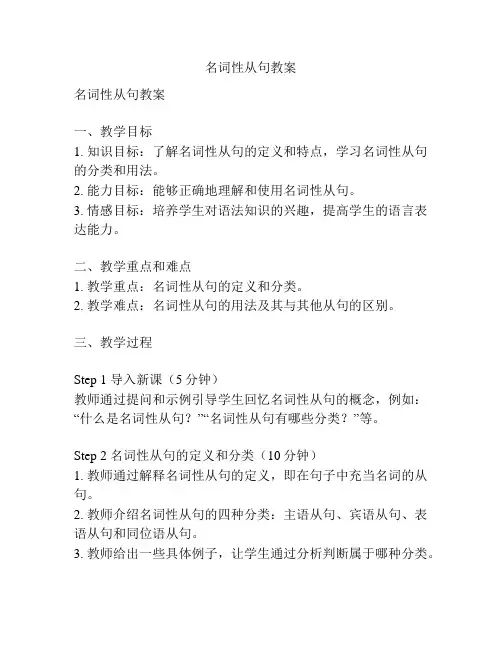
名词性从句教案名词性从句教案一、教学目标1. 知识目标:了解名词性从句的定义和特点,学习名词性从句的分类和用法。
2. 能力目标:能够正确地理解和使用名词性从句。
3. 情感目标:培养学生对语法知识的兴趣,提高学生的语言表达能力。
二、教学重点和难点1. 教学重点:名词性从句的定义和分类。
2. 教学难点:名词性从句的用法及其与其他从句的区别。
三、教学过程Step 1 导入新课(5分钟)教师通过提问和示例引导学生回忆名词性从句的概念,例如:“什么是名词性从句?”“名词性从句有哪些分类?”等。
Step 2 名词性从句的定义和分类(10分钟)1. 教师通过解释名词性从句的定义,即在句子中充当名词的从句。
2. 教师介绍名词性从句的四种分类:主语从句、宾语从句、表语从句和同位语从句。
3. 教师给出一些具体例子,让学生通过分析判断属于哪种分类。
Step 3 主语从句的用法和特点(15分钟)1. 教师通过例句和归纳总结,介绍主语从句的用法和特点。
2. 教师给出一些练习题,让学生完成句子的改写,将句子中的主语替换为主语从句。
Step 4 宾语从句的用法和特点(15分钟)1. 教师通过例句和归纳总结,介绍宾语从句的用法和特点。
2. 教师给出一些练习题,让学生完成句子的改写,将句子中的宾语替换为宾语从句。
Step 5 表语从句的用法和特点(15分钟)1. 教师通过例句和归纳总结,介绍表语从句的用法和特点。
2. 教师给出一些练习题,让学生完成句子的改写,将句子中的表语替换为表语从句。
Step 6 同位语从句的用法和特点(15分钟)1. 教师通过例句和归纳总结,介绍同位语从句的用法和特点。
2. 教师给出一些练习题,让学生完成句子的改写,将句子中的同位语替换为同位语从句。
Step 7 小结和巩固(10分钟)1. 教师对本课内容进行小结,确保学生对名词性从句有基本的理解和掌握。
2. 教师给出几道练习题,让学生进行巩固练习。
Step 8 作业布置(5分钟)教师布置相应的作业,要求学生通过完成作业进一步巩固和复习本课所学内容。
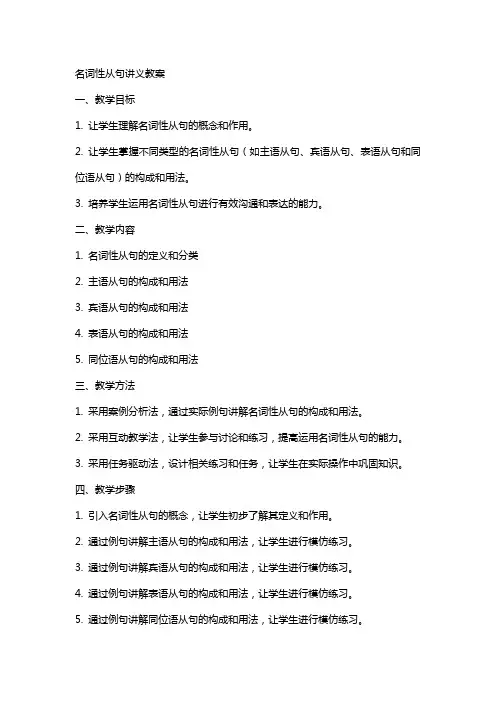
名词性从句讲义教案一、教学目标1. 让学生理解名词性从句的概念和作用。
2. 让学生掌握不同类型的名词性从句(如主语从句、宾语从句、表语从句和同位语从句)的构成和用法。
3. 培养学生运用名词性从句进行有效沟通和表达的能力。
二、教学内容1. 名词性从句的定义和分类2. 主语从句的构成和用法3. 宾语从句的构成和用法4. 表语从句的构成和用法5. 同位语从句的构成和用法三、教学方法1. 采用案例分析法,通过实际例句讲解名词性从句的构成和用法。
2. 采用互动教学法,让学生参与讨论和练习,提高运用名词性从句的能力。
3. 采用任务驱动法,设计相关练习和任务,让学生在实际操作中巩固知识。
四、教学步骤1. 引入名词性从句的概念,让学生初步了解其定义和作用。
2. 通过例句讲解主语从句的构成和用法,让学生进行模仿练习。
3. 通过例句讲解宾语从句的构成和用法,让学生进行模仿练习。
4. 通过例句讲解表语从句的构成和用法,让学生进行模仿练习。
5. 通过例句讲解同位语从句的构成和用法,让学生进行模仿练习。
五、课后作业1. 总结名词性从句的构成和用法,写一篇短文进行阐述。
2. 设计一个包含名词性从句的对话或短文,与同学互相交流。
3. 收集相关资料,深入了解名词性从句在实际语境中的应用。
教学评价:1. 课后作业的完成情况,观察学生对名词性从句的掌握程度。
2. 在下一节课中,让学生运用所学知识进行口语表达,检验其运用能力。
3. 通过课堂提问和练习,了解学生在学习过程中遇到的困难和问题,及时进行反馈和指导。
六、教学案例分析1. 案例一:主语从句句子:What he sd surprised us all.分析:该句中,主语从句"What he sd" 作为整个句子的主语,回答了"谁的话让我们惊讶" 的问题。
2. 案例二:宾语从句句子:I don't know where he is.分析:该句中,宾语从句"where he is" 作为动词"know" 的宾语,回答了"我不知道的地方" 的问题。
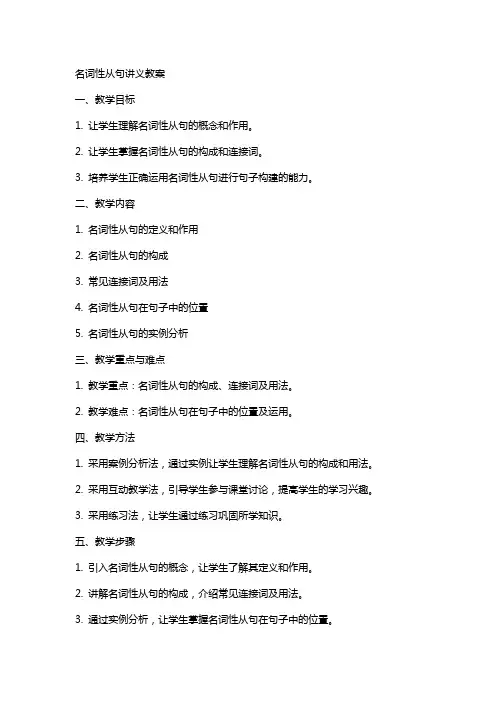
名词性从句讲义教案一、教学目标1. 让学生理解名词性从句的概念和作用。
2. 让学生掌握名词性从句的构成和连接词。
3. 培养学生正确运用名词性从句进行句子构建的能力。
二、教学内容1. 名词性从句的定义和作用2. 名词性从句的构成3. 常见连接词及用法4. 名词性从句在句子中的位置5. 名词性从句的实例分析三、教学重点与难点1. 教学重点:名词性从句的构成、连接词及用法。
2. 教学难点:名词性从句在句子中的位置及运用。
四、教学方法1. 采用案例分析法,通过实例让学生理解名词性从句的构成和用法。
2. 采用互动教学法,引导学生参与课堂讨论,提高学生的学习兴趣。
3. 采用练习法,让学生通过练习巩固所学知识。
五、教学步骤1. 引入名词性从句的概念,让学生了解其定义和作用。
2. 讲解名词性从句的构成,介绍常见连接词及用法。
3. 通过实例分析,让学生掌握名词性从句在句子中的位置。
4. 进行课堂练习,让学生运用所学知识进行句子构建。
六、教学活动1. 设计小游戏,让学生在轻松的氛围中学习名词性从句。
例如,老师说出一个句子,学生需要快速判断其中是否包含名词性从句,并指出连接词。
2. 学生分组进行讨论,分享各自收集到的名词性从句实例,互相学习和交流。
七、教学评价1. 课堂参与度评价:观察学生在课堂上的发言和互动情况,评估他们对名词性从句的理解和运用程度。
2. 课后作业评价:检查学生完成的课后作业,评估他们对名词性从句的掌握情况。
八、教学拓展1. 引导学生思考名词性从句在实际交流中的应用,例如在写作、口语表达等方面。
2. 引导学生探索其他类型的从句,如定语从句、状语从句等,提高学生的语法综合运用能力。
九、教学资源1. 教案、PPT课件2. 名词性从句实例及分析3. 练习题及答案4. 相关语法参考书籍、网络资源十、课后作业a. 我喜欢读书。
(连接词:that/which)b. 昨天我遇到了一个有趣的人。
(连接词:who)c. 那个问题是很难解决的。
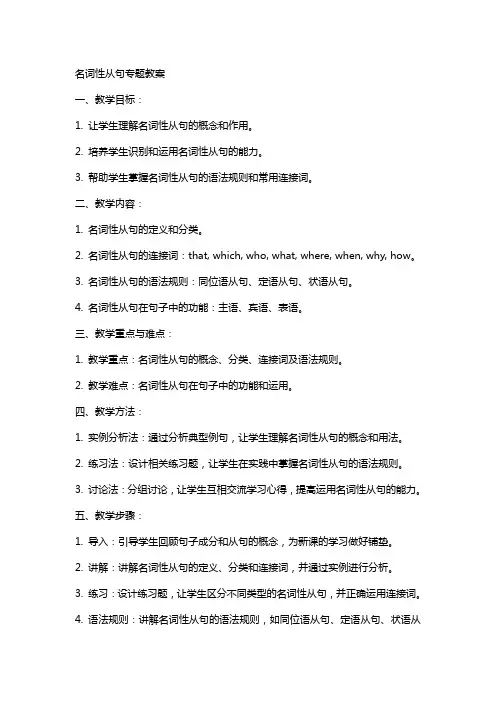
名词性从句专题教案一、教学目标:1. 让学生理解名词性从句的概念和作用。
2. 培养学生识别和运用名词性从句的能力。
3. 帮助学生掌握名词性从句的语法规则和常用连接词。
二、教学内容:1. 名词性从句的定义和分类。
2. 名词性从句的连接词:that, which, who, what, where, when, why, how。
3. 名词性从句的语法规则:同位语从句、定语从句、状语从句。
4. 名词性从句在句子中的功能:主语、宾语、表语。
三、教学重点与难点:1. 教学重点:名词性从句的概念、分类、连接词及语法规则。
2. 教学难点:名词性从句在句子中的功能和运用。
四、教学方法:1. 实例分析法:通过分析典型例句,让学生理解名词性从句的概念和用法。
2. 练习法:设计相关练习题,让学生在实践中掌握名词性从句的语法规则。
3. 讨论法:分组讨论,让学生互相交流学习心得,提高运用名词性从句的能力。
五、教学步骤:1. 导入:引导学生回顾句子成分和从句的概念,为新课的学习做好铺垫。
2. 讲解:讲解名词性从句的定义、分类和连接词,并通过实例进行分析。
3. 练习:设计练习题,让学生区分不同类型的名词性从句,并正确运用连接词。
4. 语法规则:讲解名词性从句的语法规则,如同位语从句、定语从句、状语从句。
5. 句子功能:分析名词性从句在句子中的主语、宾语、表语等功能。
6. 拓展:介绍名词性从句在实际应用中的注意事项和技巧。
8. 作业布置:设计课后练习题,巩固所学知识。
9. 课堂互动:鼓励学生提问、讨论,提高课堂参与度。
10. 反馈与评价:课后收集学生作业,对学生的学习情况进行评价和反馈。
六、教学评估:1. 课后作业:设计一份包含各种类型名词性从句的作业,要求学生在规定时间内完成,以检验其对课堂所学内容的掌握情况。
2. 课堂练习:在课堂上,为学生提供即时练习的机会,通过口头提问或书面练习,及时发现并纠正学生在使用名词性从句时的错误。

名词性从句teaching plan一、学情分析名词性从句是高中阶段学生接触到的较难的语法点,很多学生分不清楚名词性从句,定语从句和状语从句之间的区别,经常出现混用的现象。
但在高考中名词性从句为必考项目,甚至在学业水平考试中都有要求,因此,学生复习名词性从句的用法有着重要意义,它对于学生分辨各种复合句有一定的指导作用,扫除名词性从句的障碍可以有助于学生学习其他的复合句,并对其书面表达和语法填空的提高有指导意义。
二、教学目标1.知识与技能A.复习名词性从句的种类及构成;B.正确辨识并使用名词性从句的连接词;C.复习it作形式宾语在句子中代替宾语从句。
2. 过程与方法A.图解法B.列举法C.讲授法D.演示法3. 情感态度与价值观A.培养学生的规范语言表达;B.让学生体会语言的灵活多变。
C.让学生体验学习的乐趣和成功的喜悦。
三、教学重、难点1.名词性从句的作用;2.正确判断并使用连接词;3.名词性从句的表现形式;4.It作形式主语和形式宾语的用法。
四、教学方法:1.合作交流,小组讨论。
2.自主学习,独立思考。
3.探究学习。
五、渗透法制教育教学步骤:Before class:一.先学任务1.复习五种简单句中的“主+谓”结构、“主+谓+宾”结构、“主+系+表”结构;2.对比以下几个句子,区分其分别属于哪种从句。
1)What she said was right. (主从)2)I have no idea how she did it.(同位语从句)3)It’s a pity that you failed the exam.(主从)4)I’m sure that I will see you again.(宾从)5)What I want to know is when we’ll leave for Beijing.(主从、表从)6)Teachers consider it necessary that students should finish their homework.(宾从)3. 用适当的连接代词或连接副词填空。
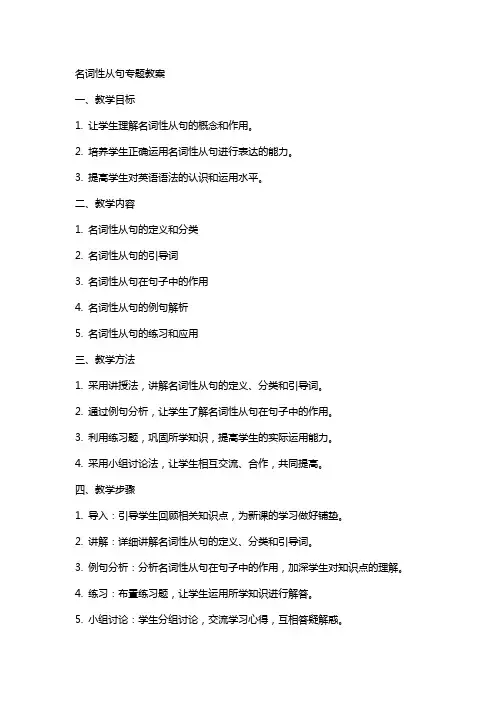
名词性从句专题教案一、教学目标1. 让学生理解名词性从句的概念和作用。
2. 培养学生正确运用名词性从句进行表达的能力。
3. 提高学生对英语语法的认识和运用水平。
二、教学内容1. 名词性从句的定义和分类2. 名词性从句的引导词3. 名词性从句在句子中的作用4. 名词性从句的例句解析5. 名词性从句的练习和应用三、教学方法1. 采用讲授法,讲解名词性从句的定义、分类和引导词。
2. 通过例句分析,让学生了解名词性从句在句子中的作用。
3. 利用练习题,巩固所学知识,提高学生的实际运用能力。
4. 采用小组讨论法,让学生相互交流、合作,共同提高。
四、教学步骤1. 导入:引导学生回顾相关知识点,为新课的学习做好铺垫。
2. 讲解:详细讲解名词性从句的定义、分类和引导词。
3. 例句分析:分析名词性从句在句子中的作用,加深学生对知识点的理解。
4. 练习:布置练习题,让学生运用所学知识进行解答。
5. 小组讨论:学生分组讨论,交流学习心得,互相答疑解惑。
6. 总结:对本节课的内容进行归纳总结,强调重点和难点。
五、课后作业1. 复习本节课所学内容,整理笔记。
2. 完成课后练习题,巩固所学知识。
3. 搜集名词性从句的实际应用例句,进行分析和总结。
六、教学评估1. 课堂问答:通过提问,了解学生对名词性从句的理解程度。
2. 练习题:批改学生完成的练习题,检查他们对知识的掌握情况。
3. 小组讨论:观察学生在小组讨论中的表现,了解他们的合作能力和交流技巧。
七、教学拓展1. 对比分析:让学生区分名词性从句和其他相关语法现象,如定语从句、状语从句等。
2. 实战演练:让学生运用所学知识,修改或创作句子,提高实际运用能力。
3. 课外阅读:推荐相关阅读材料,扩大学生的语法知识视野。
八、教学反馈1. 学生反馈:收集学生对课堂内容的意见和建议,以便改进教学方法。
2. 家长反馈:与家长沟通,了解学生在家的学习情况,加强家校合作。
3. 自我反思:教师课后对自己的教学进行反思,找出不足之处,不断提高教学质量。

高中英语名词性从句一、教学目标:1. 让学生理解名词性从句的概念和作用。
2. 让学生掌握引导名词性从句的词,如that, which, who, what等。
3. 培养学生正确运用名词性从句进行口语表达和写作的能力。
二、教学内容:1. 名词性从句的定义和分类。
2. 引导名词性从句的词及其用法。
3. 名词性从句在句子中的作用。
三、教学重点与难点:1. 教学重点:名词性从句的概念、分类和引导词的用法。
2. 教学难点:名词性从句在句子中的作用和灵活运用。
四、教学方法:1. 采用案例分析法,通过实例讲解名词性从句的用法。
2. 采用互动教学法,引导学生参与课堂讨论,提高口语表达能力。
3. 采用练习法,让学生通过练习巩固所学知识。
五、教学步骤:1. 引入名词性从句的概念,让学生初步了解。
2. 讲解引导名词性从句的词,如that, which, who, what等,并通过实例进行分析。
3. 讲解名词性从句的分类,如宾语从句、表语从句、同位语从句等,并通过实例进行分析。
4. 讲解名词性从句在句子中的作用,如提供信息、引导句子等。
5. 进行课堂练习,让学生运用所学知识进行口语表达和写作。
6. 总结本节课所学内容,布置课后作业,巩固所学知识。
六、教学评价:1. 课堂参与度:观察学生在课堂讨论中的积极性,以及他们对名词性从句的理解程度。
2. 练习完成情况:检查学生完成练习的情况,评估他们对名词性从句用法的掌握程度。
3. 课后作业:评估学生课后作业的完成质量,检查他们对课堂所学知识的巩固情况。
七、教学资源:1. 教学PPT:展示名词性从句的定义、分类和引导词等知识点。
2. 案例分析:提供实例,让学生更好地理解名词性从句的用法。
3. 练习题:设计练习题,帮助学生巩固所学知识。
八、教学拓展:1. 引导学生了解其他类型的从句,如定语从句、状语从句等,以便学生能够更好地理解英语句子的结构。
2. 组织英语角活动,让学生在实际交流中运用名词性从句,提高口语表达能力。
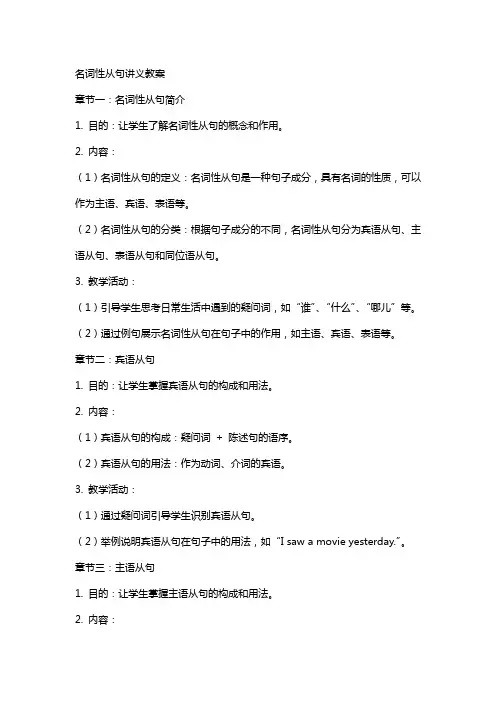
名词性从句讲义教案章节一:名词性从句简介1. 目的:让学生了解名词性从句的概念和作用。
2. 内容:(1)名词性从句的定义:名词性从句是一种句子成分,具有名词的性质,可以作为主语、宾语、表语等。
(2)名词性从句的分类:根据句子成分的不同,名词性从句分为宾语从句、主语从句、表语从句和同位语从句。
3. 教学活动:(1)引导学生思考日常生活中遇到的疑问词,如“谁”、“什么”、“哪儿”等。
(2)通过例句展示名词性从句在句子中的作用,如主语、宾语、表语等。
章节二:宾语从句1. 目的:让学生掌握宾语从句的构成和用法。
2. 内容:(1)宾语从句的构成:疑问词+ 陈述句的语序。
(2)宾语从句的用法:作为动词、介词的宾语。
3. 教学活动:(1)通过疑问词引导学生识别宾语从句。
(2)举例说明宾语从句在句子中的用法,如“I saw a movie yesterday.”。
章节三:主语从句1. 目的:让学生掌握主语从句的构成和用法。
2. 内容:(1)主语从句的构成:疑问词+ 陈述句的语序。
(2)主语从句的用法:作为主语,表示话题或陈述对象。
3. 教学活动:(1)通过疑问词引导学生识别主语从句。
(2)举例说明主语从句在句子中的用法,如“That she is ing is good news.”。
章节四:表语从句1. 目的:让学生掌握表语从句的构成和用法。
2. 内容:(1)表语从句的构成:疑问词+ 陈述句的语序。
(2)表语从句的用法:作为表语,补充说明主语的内容。
3. 教学活动:(1)通过疑问词引导学生识别表语从句。
(2)举例说明表语从句在句子中的用法,如“The problem is that we don't have enough time.”。
章节五:同位语从句1. 目的:让学生掌握同位语从句的构成和用法。
2. 内容:(1)同位语从句的构成:疑问词+ 陈述句的语序。
(2)同位语从句的用法:与前面的名词或代词共同作主语、宾语或表语,起到解释说明的作用。
公开课教案名词性从句一、教学目标1. 让学生理解名词性从句的概念和作用。
2. 培养学生识别和运用名词性从句的能力。
3. 提高学生对英语语法的掌握和运用水平。
二、教学内容1. 名词性从句的定义和分类2. 名词性从句的连接词3. 名词性从句在句子中的作用4. 名词性从句的例句解析5. 名词性从句的练习题三、教学过程1. 导入:通过一个谜语引出名词性从句的概念,激发学生的兴趣。
2. 讲解:详细讲解名词性从句的定义、分类、连接词及在句子中的作用。
3. 示例:分析一些名词性从句的例句,让学生理解并掌握其用法。
4. 练习:让学生做一些关于名词性从句的练习题,巩固所学知识。
5. 总结:对本节课的内容进行总结,强调重点和难点。
四、教学方法1. 讲授法:讲解名词性从句的概念、分类、连接词及作用。
2. 示例分析法:分析名词性从句的例句,让学生理解和掌握用法。
3. 练习法:让学生通过做练习题来巩固所学知识。
4. 互动法:鼓励学生提问、发表观点,提高课堂参与度。
五、教学评价1. 课堂表现:观察学生在课堂上的参与程度、提问和回答问题的积极性。
2. 练习题:评估学生在练习题中的表现,检查其对名词性从句的掌握程度。
3. 课后作业:布置相关的课后作业,要求学生在课后巩固所学知识。
4. 期中期末考试:通过考试检验学生对名词性从句的掌握情况。
六、教学资源1. 课件:制作精美的课件,展示名词性从句的概念、分类、连接词及例句。
2. 练习题:准备一些关于名词性从句的练习题,包括选择题、填空题和改错题。
3. 课后作业:设计一些具有挑战性的课后作业,让学生进一步巩固所学知识。
4. 教学视频:寻找一些教学视频,展示名词性从句的用法和实例。
七、教学步骤1. 导入:通过一个谜语引出名词性从句的概念,激发学生的兴趣。
2. 讲解:详细讲解名词性从句的定义、分类、连接词及在句子中的作用。
3. 示例:分析一些名词性从句的例句,让学生理解并掌握其用法。
4. 练习:让学生做一些关于名词性从句的练习题,巩固所学知识。
名词性从句教案教案主题:名词性从句年级:高中课时:1课时教学目标:1. 了解名词性从句的定义和特点。
2. 学会区分和使用名词性从句的四种类型:主语从句、宾语从句、表语从句和同位语从句。
教学准备:1. 课件或黑板2. 教材:- 教材中的相关课文或对话- 练习题目教学过程:引入:1. 师生互动讨论:什么是从句?什么是名词性从句?2. 师生互动讨论:你们能列举出名词性从句的作用和功能吗?3. 通过引导学生讨论,确定课程目标:了解名词性从句的定义和特点,学会区分和使用名词性从句的四种类型。
知识讲解:1. 名词性从句的定义和特点- 名词性从句是指在句子中担任名词的成分的从句。
- 名词性从句的特点是可以在句子中作为主语、宾语、表语或者同位语。
2. 名词性从句的四种类型- 主语从句:在句子中作为主语的从句。
例句:What he said is interesting.(他说的话很有趣。
)- 宾语从句:在句子中作为动词的宾语的从句。
例句:I don't know where he is.(我不知道他在哪里。
)- 表语从句:在句子中作为表语的从句。
例句:Her dream is to become a doctor.(她的梦想是成为一名医生。
)- 同位语从句:在句子中作为同位语的从句。
例句:The news that he won the prize made me happy.(他获奖的消息使我很高兴。
)练习与巩固:1. 让学生完成相关练习题目,如填空、改错等。
2. 随堂检查练习题答案,并进行讲解和纠错。
拓展活动:1. 让学生自己编写一些句子,其中包含不同类型的名词性从句。
2. 学生分组表演以名词性从句为基础的对话或小剧场。
总结与反思:1. 总结名词性从句的定义和特点。
2. 学生对名词性从句掌握的情况进行诊断。
3. 学生对本节课的反馈和建议。
高中名词性从句教案一、教学目标1. 让学生理解名词性从句的概念和作用。
2. 让学生掌握不同类型的名词性从句(如主语从句、宾语从句、表语从句和同位语从句)的构成和用法。
3. 培养学生正确运用名词性从句进行口语和书面表达的能力。
二、教学内容1. 名词性从句的定义和分类2. 名词性从句的构成和用法3. 名词性从句的练习和应用三、教学重点与难点1. 重点:名词性从句的构成和用法2. 难点:不同类型名词性从句的区分和运用四、教学方法1. 采用案例分析法,通过举例让学生理解名词性从句的概念和用法。
2. 运用练习法,让学生通过实际操作练习名词性从句的构成和运用。
3. 采用互动教学法,鼓励学生积极参与,提高口语表达能力。
五、教学过程1. 导入:引导学生回顾句子成分的知识,为新课的学习打下基础。
2. 讲解:讲解名词性从句的定义、分类、构成和用法。
3. 案例分析:分析典型例句,让学生理解不同类型的名词性从句。
4. 练习:设计练习题,让学生巩固所学知识。
5. 互动教学:组织小组讨论,让学生运用名词性从句进行口语表达。
6. 总结:对本节课的内容进行总结,强调重点和难点。
7. 作业布置:布置课后作业,巩固所学知识。
六、教学评价1. 课后作业:布置有关名词性从句的练习题,要求学生在课后进行复习和巩固。
2. 课堂练习:在课堂上进行名词性从句的练习,观察学生的掌握情况。
3. 口语表达:在课堂上提供机会让学生运用名词性从句进行口语表达,评估其应用能力。
4. 小组讨论:评估学生在小组讨论中的表现,了解他们对于名词性从句的理解和运用程度。
七、教学拓展1. 对比分析:引导学生比较名词性从句和其他从句(如定语从句、状语从句等)的异同。
2. 实际应用:让学生收集生活中的名词性从句实例,加深对名词性从句的理解。
3. 相关语法:介绍与名词性从句相关的语法知识,如虚拟语气、倒装等。
八、教学资源1. 教材:选用适合高中生的英语教材,如《新概念英语》、《英语语法大全》等。
高中名词性从句教案(优秀范文五篇)第一篇:高中名词性从句教案高中英语语法之名词性从句在句子中起名词作用的句子叫名词性从句 (Noun Clauses)。
名词性从句的功能相当于名词词组, 它在复合句中能担任主语、宾语、表语、同位语、介词宾语等,因此根据它在句中不同的语法功能,名词性从句又可分别称为主语从句、宾语从句、表语从句和同位语从句。
二. 主语从句1、作句子主语的从句叫主语从句。
主语从句通常由从属连词that,whether,if和连接代词what,who,which,whatever,whoever 以及连接副词how,when,where,why等词引导。
that在句中无词义,只起连接作用;连接代词和连接副词在句中既保留自己的疑问含义、又起连接作用,在从句中充当从句的成分。
例如:What he wants to tell us is not clear. 他要跟我们说什么,还不清楚。
Who will win the match is still unknown. 谁能赢得这场比赛还不得而知。
It is known to us how he became a writer. 我们都知道他是如何成为一名作家的。
Where the English evening will be held has not yet been announced. 英语晚会将在哪里举行,还没有宣布。
另注意在主语从句中用来表示惊奇、不相信、惋惜、理应如此等语气时,谓语动词要用虚拟语气“(should) +do”,常用的句型有:It is necessary (imp ortant, natural, strange, etc.) that …It is suggested (requested, proposed, desired, etc.) that…2、第一部分:常规主语从句,即句子在复合句中充当一个主语主语从句的时态:不受主句的时态影响和限制。
高中英语《名词性从句》教案导语:名词性从句作为英语语法的重要一部分,在高中英语教学中占据着不可忽视的地位。
它既是从句的一种类型,又是名词的一种用法。
本教案将详细介绍名词性从句的定义、分类以及用法,并给出相关的例句和练习。
一、基本概念名词性从句是在复合句中作主语、宾语、表语、同位语等成分的从句。
二、分类1. 强调句型主语从句、宾语从句、表语从句和同位语从句。
2. 名词性从句的引导词①连接代词:that, whether, what, who, whom, whose, which, whoever, whichever, whatever等。
例如:- I know that he is a doctor.(主语从句)- Can you tell me whether it will rain tomorrow?(宾语从句)②连接副词:how, when, where, why等。
例如:- I don't know how he did it.(宾语从句)- Tell me when you will be back.(宾语从句)三、用法1. 名词性从句作主语主语从句在句中充当主语,常由连接词that引导。
例如:- That he passed the exam is not surprising.(连接词that 引导的主语从句)2. 名词性从句作宾语宾语从句在句中充当宾语,位置一般在及物动词或介词后面。
例如:- She doesn't know where he lives.(连接词where引导的宾语从句)3. 名词性从句作表语表语从句在句中充当表语,常由连接词that引导。
例如:- The important thing is whether he can come to the party.(连接词whether 引导的表语从句)4. 名词性从句作同位语同位语从句在句中充当同位语,通常用that引导。
名词性从句专题教案一、教学目标1. 让学生理解名词性从句的概念和用法。
2. 培养学生正确运用名词性从句进行句子构建的能力。
3. 提高学生英语语法的综合运用能力。
二、教学内容1. 名词性从句的定义和分类2. 连接词的使用3. 名词性从句的语序4. 名词性从句在句子中的作用5. 实例分析和练习三、教学方法1. 采用互动式教学,激发学生的学习兴趣和积极性。
2. 通过例句和练习,让学生在实践中掌握名词性从句的用法。
3. 引导学生进行小组讨论和合作,提高学生的团队协作能力。
4. 给予学生充分的思考空间,培养他们的创新思维。
四、教学步骤1. 引入名词性从句的概念,让学生初步了解。
2. 讲解名词性从句的分类和连接词的使用。
3. 引导学生掌握名词性从句的语序。
4. 分析名词性从句在句子中的作用。
5. 提供实例和练习,让学生进行实际操作和应用。
五、教学评价1. 课堂参与度:观察学生在课堂上的发言和互动情况,评估他们的学习兴趣和积极性。
2. 练习完成情况:检查学生完成练习的情况,评估他们的理解和应用能力。
3. 小组讨论:评估学生在小组讨论中的表现,包括团队合作和创新思维。
4. 课后作业:布置相关作业,评估学生对课堂内容的掌握程度。
六、教学内容1. 名词性从句的替代形式2. 名词性从句在特定语境中的应用3. 名词性从句的复杂结构4. 名词性从句与其他语法结构的结合5. 综合练习和应用七、教学方法1. 采用任务型教学,让学生在完成实际任务中运用名词性从句。
2. 通过多媒体资源,如视频和音频,增强学生对名词性从句的理解和记忆。
3. 提供丰富的练习题,让学生在不同语境中运用名词性从句。
4. 组织角色扮演和情景模拟,提高学生的口语表达能力。
八、教学步骤1. 讲解名词性从句的替代形式,如代词和名词短语。
2. 提供特定语境,让学生在实际场景中应用名词性从句。
3. 分析名词性从句的复杂结构,如嵌套和并列。
4. 引导学生将名词性从句与其他语法结构相结合,如定语从句和状语从句。
语法复习专题(11)Unit11 名词性从句一、考点聚焦1、名词性从句中连接词的运用名词性从句中的连接词有连词that / whether / as if,连接代词what / who/ which / whose / whatever / whoever / whomever / whichever,连接副词where / when / why / how / wherever / whenever。
(1)that的用法。
①主语从句、表语从句、同位语从句中用that但不能省略。
如:That they are good at English is known to us all.The problem is that we don’t have enough money.She expressed the hope that they would come to China one day.②宾语从句中的连接词that有时可省有时又不可省,在以下几种情况中that不能省略:(A)当that从句和主句谓语动词之间有插入词语或者从句主语之间有插入语时,that不可省略;(B)当that 从句与另一名词性从句并列作宾语时,that不能省;(C)当that作介词宾语时,that不可省掉。
如:He judged that,because he was a child, he did not understandwineEveryone knew what happened and that she was worried.The reason lies in that she works harder than the others do.③that从句作主语和宾语时,可以用it 来替换成以下几种结构表达。
(A)It is clear/certain/likely/true/surprising that… (B)It is a pity/shame/good idea/no wonder that ...(C)It is said/reported/ believed/known/thought/suggested that … (D)It seems/happens that。
如:It happened that I went out last night.It is said that China will win in the World Cup.④that和what的区别。
that 引导名词性从句时,在主从句中不以当任何句子成分,也没有任何含义;而what 引导名词性从句时,在主从句中都要充当一定的句子成分,what可以分解成定语从句中的先行词 + 关系代词即常说的先行词 + that。
如:It’s shame that he has made such a mistake. Do what he says.⑤同位语从句与定语从句中that的区别。
同位语从句中的连词that只起连接作用,在从句中不担当任何句子成分;而定语从句中的关系代词that在句中做宾语或主语,宾语与先行词有修饰关系。
如果句子是同位语从句,就应用连词that而不能用which.同位语从句一般放在表具体含义的名词后解释名词的含义或内容,如以下名词:news、fact、suggestion、truth、plan、belief、doubt、possibility、idea等,而定语从句只是对先行词的限定和修饰。
如:They expressed the hope that they would come to visit China again.(同位语从句)The hope she expressed is that they would come to visit China again.(定语从句)(2)whether和if的用法。
①whether和if在宾语从句中可以互换,但是作介词宾语时连接词一般用whether。
如:It all depends on whether they will come back.②后面直接跟or not 时用whether。
如:I did n’t know whether or not he had arrived in Wuhan.③主语从句表语从句中只能用whether。
如:Whether the meeting will be put off has not been decided yet.The question is whether they have so much money.④whether可以引导同位语从句,用以说明前面的名词的内容,if不能。
如:We ought to discuss carefully the question whether we can doit or not.⑤whether常与or连用表示一种选择,if不能这样用;whether也可与动词不定式连用但if不能。
如:The question of whether they are male or female is not impor-tant.I have not decided whether to go or not.⑥间接引语位于句首时或者是间接引语提前时用whether不用if。
如:Thank you, but w hether I’ll be free I’m not sure at the moment.⑦whether可引导一个让步状语从句表示“不管”、“无论”,而if不能。
如:Whether he comes or not, we will begin our party on time.(3)疑问词 + ever和no matter + 疑问词的区别。
①疑问词 + ever可引导名词性从句,在主从句中要充当一定的部分。
如:Whoever breaks the rule must be punished.You can choose whatever you like in the shop.②疑问词 + ever还可引导让步状语从句。
如:Whoever breaks the rule, he must be punished,Whatever you do, you must do it well.③no matter + 疑问词只能引导让步状语从句。
如:No matter what you do, you must do it well.No matter who breaks the rule, he must be punished.(4)when和where引导的同位语从句与定语从句的区别。
when 和where前面的名词若是表示时间、地点的名词,则when和where引导的是定语从句,否则则为同位语从句。
如:They put forward the question where they could get the money.This is the place where the accident happened.2、名词性从句中主句和从句的时态一致(1)宾语从句中主句和从句的时态保持一致,但如果从句中表示提示的是客观现象,虽然主句是过去时态,从句仍用一般现在时。
如:Hello,I didn’t know you were in London. How long have you been here?The teacher told us that light travels at a very high speed.(2)主语从句作主语相当于单数第三人称作主语,谓语动词用单数,如果由and 连接两个或两个以上的主语从句作主语时,谓语动词用复数;由两个或多个连接词引导一个主语从句,谓语动词用单数。
如:When the meeting will begin has not been decided yet.When they will start and where they go have not been decided yet.When and where the meeting will begin has not been decided.3、名词性从句的词序名词性从句在句中要用陈述句语序。
如:He asked me what was the matter with me.We’ve heard the news that we’ll move into the new house.Whatever you say will interest us all.二、精典名题导解选择填空1. A computer can only do ________ you have instructed it to do.(NMET 2001)A.howB.afterC.whatD.when解析:答案为C。
本题考查的是名词性从句作宾语的用法。
此句的引导词既作连词又在宾语从句中充当一成分,故what最合适。
2. —I drove to Zhuhai for the air show last week..—Is that _________ you had a few days off ? (NMET 99)A.whyB.whenC.whatD.where解析:答案为A。
此题考查的是从句的用法。
根据题意“我上周开车去珠海看航空展去了。
”下面一句接着问:“那就是你为什么离开的原因吗?”故用why引导表语从句表示原因。
3. I hate __________ when peope talk with their mouths full.(NMET 98)A.itB.thatC.theseD.them解析:答案为A。
本题考查的是形式宾语的用法。
题意为“我讨厌人们谈话时嘴里塞满东西”。
该空白处没有任何含义,而且已经用了when连接该宾语从句,所以此处只填一个形式宾语it。
4.I think Father would like to know I’ve been up to so far, so I decide to send him aquick note.A. whichB. whyC. whatD. how解析:答案为C。
考查宾语从句连词用法,由结构sb. be up to sth.可知,应选what作介词to的宾语。
5.We cannot figure out quite a number of insects, birds, and animals are dying out.A. thatB. asC. whyD. when解析:答案为C。